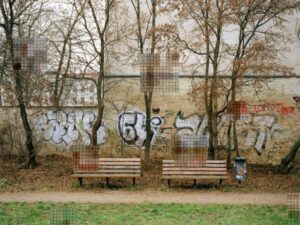History Professor is Founding Member of Online German Studies Collaboratory
Andrew Evans, associate professor of history, brought collaboration to the COVID coping toolkit and in the process, became a part of the birth of The German Studies Collaboratory, an online collaborative resource for educators and students alike.

Evans is a member of the German Studies Association, a professional organization of scholars teaching German history, culture and language. Interdisciplinary networks within the association allow members to explore topics of varying interests, including the German Studies Teaching network, of which Evans is a founding member.
When the COVID virus moved the Spring 2020 semester online and forced many educators to shift their courses to remote delivery, this cohort of educators began discussing how they could best share resources for remote teaching with each other, as well as other educators and students.
After many internal discussions, members of the German Studies Association, led by Jennifer Evans, professor of history at Carleton University, collaborated with the Digital Humanities and Decolonizing German Studies Curriculum networks to build what has become the German Studies Collaboratory web site.

At its essence, the Collaboratory is a web-based resource for educators and students consisting of three hubs: the Teaching Hub, which contains syllabi and assignments; the Media Hub, which contains recorded talks and podcasts; and the Digital Hub, which links to online collections of useful German Studies materials. Each hub is maintained by a team, with responsibilities rotated among team members, allowing for a manageable workload for all collaborators.
In developing content, collaborators sought to answer the question: “What kind of materials will people need and be looking for as they plan their courses for Fall?” The ultimate goal of the Collaboratory is to provide a collection of vetted materials in a single location that are easily found and readily incorporated into course design.
“Instead of being defeated by the moment, we need to respond to it, and this is an example of how we chose to respond to the crisis,” Evans said.

Another feature of the Collaboratory site is the Zeitnah Blog, which affords a place for contributors to share how they use the site and how others might utilize the available tools. The Collaboratory chose the word Zeitnah, meaning “timely” or “right now,” for the blog’s name to convey the sense of this contemporary moment.
All work shared to The German Studies Collaboratory is covered by a Creative Commons license, which allows noncommercial use with attribution. Evans said the Collaboratory “feels like a really positive response to the situation we find ourselves in.”
Evans curates teaching-related content for the Teaching Hub and contributes to the Zeitnah Blog. The site is designed to be inclusive and serve as a resource to professors, lecturers, graduate students, undergraduates and independent scholars.
“We’re in this moment right now where we‘re really rethinking so much about our society in all kinds of different ways. We’re also rethinking higher education. We have a chance to foster new kinds of professional networks and new ways of doings things. We just have to make the effort. The Collaboratory is an example of that effort. It is an attempt to positively respond to the crisis that we are all in,” Evans said.

Traffic to the site has been steadily increasing as opportunities to share the site arise. Collaboratory founding members run Twitter and Facebook pages for the site that include weekly updates and the sharing of new materials. Most recently, the Collaboratory hosted a session at the German Studies annual conference to introduce the resource and received a flurry of new visitors to the site – all potential contributors to the evolving collaborative online resource.
To colleagues and students alike, Evans asks, “What would your academic life look like if you put collaboration at the center of it? It would probably be more enjoyable – a much deeper and richer experience. Whatever it is that you are working on, find a way to make it collaborative.”
“I have learned so much in the last six months, it’s unbelievable,” Evans added. “It’s not every day that you can see yourself learning and improving so much in the short term. All of our teaching will be different [as a result of COVID], and I think it will be better.”
